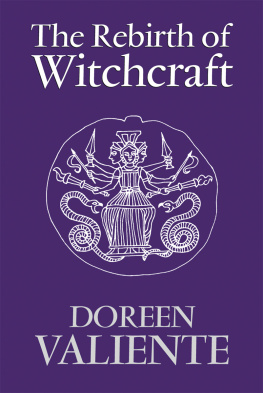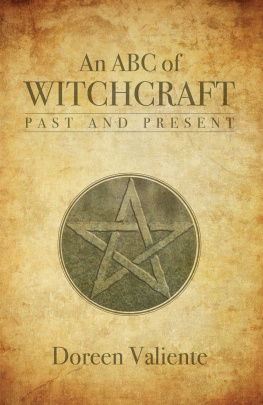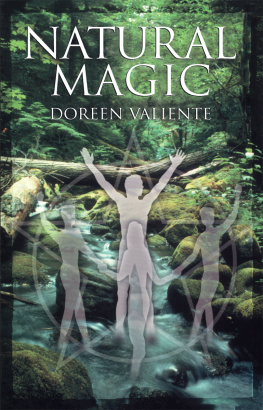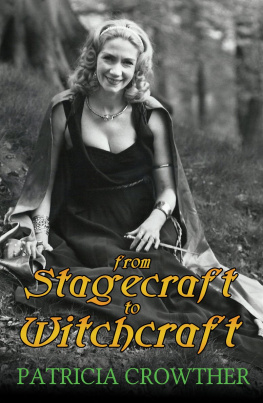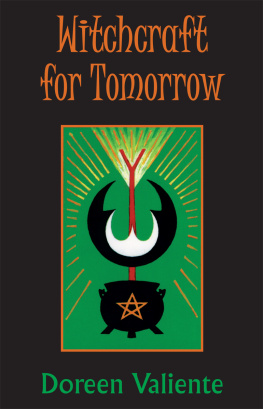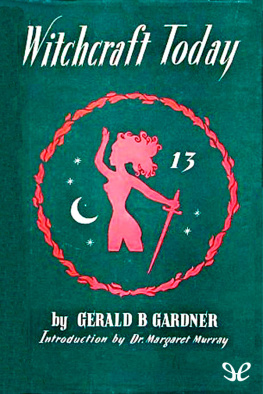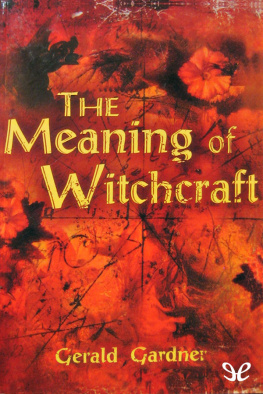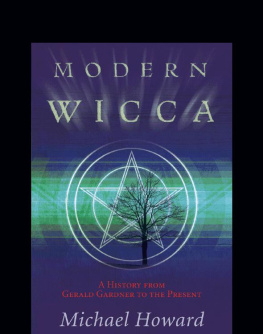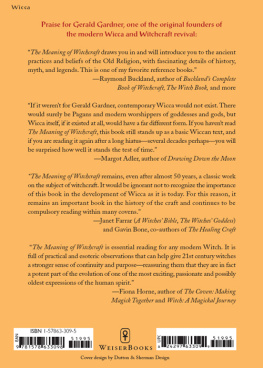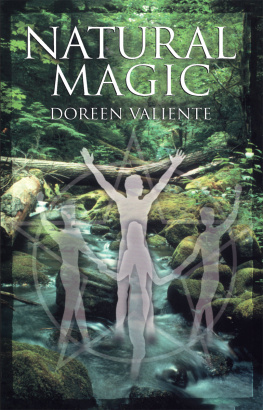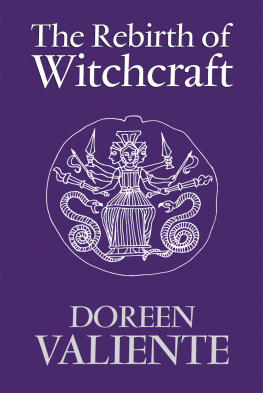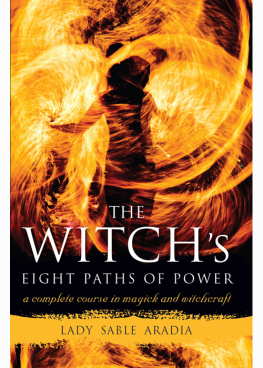The
Rebirth of
Witchcraft
DOREEN VALIENTE

ROBERT HALE
First published in 1989 by Robert Hale, an imprint of
The Crowood Press Ltd, Ramsbury, Marlborough Wiltshire SN8 2HR
www.crowood.com
This e-book first published in 2017
Paperback edition 2007
Doreen Valiente 1989
All rights reserved. This e-book is copyright material and must not be copied, reproduced, transferred, distributed, leased, licensed or publicly performed or used in any way except as specifically permitted in writing by the publishers, as allowed under the terms and conditions under which it was purchased or as strictly permitted by applicable copyright law. Any unauthorised distribution or use of this text may be a direct infringement of the authors and publishers rights, and those responsible may be liable in law accordingly.
British Library Cataloguing-in-Publication Data
A catalogue record for this book is available from the British Library.
ISBN 978 071982 693 1
The right of Doreen Valiente to be identified as author of this work has been asserted by her in accordance with the Copyright, Designs and Patents Act 1988.
Contents
The
Rebirth of
Witchcraft
Doreen Valiente was one of the founders of modern Wicca and was initiated into four different branches of the Old Religion in Great Britain. She studied the occult for more than thirty years and was one of witchcrafts most widely known figures. Over the years, Doreen Valiente made many television and radio appearances, discussing witchcraft and folklore and displaying items from her collection of witchcraft objects. She is the author of An ABC of Witchcraft: Past and Present, Natural Magic, Witchcraft for Tomorrow, and Witchcraft: A Tradition Renewed (with Evan John Jones). Doreen Valiente died in 1999.
By the same author
An ABC of Witchcraft
Natural Magic
Witchcraft for Tomorrow
Illustrations
Between Chapters 4 and 5
Portrait of the author in witch costume
The witchs cottage where Gardners coven met
The Witches Mill and Museum, Castletown, Isle of Man
Gerald Gardner
Exhibits loaned by The Southern Coven of British Witches
An equal-armed cross showing two naked female figures
The Witches Memorial
The Magicians Room at Castletown
The Witchs Cottage at Castletown
Pages from Gerald Gardners original Book of Shadows
A page from Gardners first draft of Ye Booke of Ye Art Magical
The original dust-jacket of High Magics Aid
A present-day male witch in full ceremonial regalia
Between Chapters 8 and 9
Drawing down the Moon. A sketch by Gardner
Initiation scenes from the Villa of the Mysteries at Pompeii
The author standing by the tree stump known as the Naked Man
A Sussex white witch at the Long Man of Wilmington
The Goddess as the Spinner of Destiny
The signs of John Brakespeares ritual knife
Maddalena, C.G. Lelands Italian witch friend
Drawing by C.G. Leland
Implements of ceremonial magic
The Wheel of Hecate
A witchs shrine arranged by the author and representing the four elements
Rosaleen Nortons witchs shrine
Three different forms of the Horned God
PICTURE CREDITS
Ron Cooke: 1, 17. Nigel Holland, Brighton Evening Argus: 14. Jeff Overs, Brighton Evening Argus: 18. Doreen Valiente: 20, 23-5, 27. All other illustrations in the collection of the author. The author has made every effort to identify copyright holders and to obtain their permission but would be glad to hear of any inadvertent errors or omissions.
1Why Then?
If the average person were asked, When was the last big witch trial in Britain?, they would probably reply, Oh, I suppose about two or three hundred years ago. They would be wrong. It took place at the Old Bailey in 1944. The accused was a Spiritualist medium, Helen Duncan. She was charged under the Witchcraft Act of 1735, found guilty after a trial which lasted for eight days and sentenced to nine months imprisonment.
The recorders summing-up of the case lasted nearly two hours, and in the course of it he is reported as saying: If Mrs Duncan, by going into a trance or simulating a trance, pretended to hold communion with the spirits, that was the kind of conjuration which is referred to in the Witchcraft Act. The emphasis is on the word pretend and the offence, if there was an offence, began as soon as it was claimed to do that kind of thing.
In spite of the recorders assurance that, This prosecution does not involve any attack on Spiritualism, it became very obvious throughout the trial that it did. Spiritualists found themselves in a situation in which they could not defend themselves from prosecution whenever the authorities chose to make a target of them. Saying that they were not pretending but that their seances were genuine was no defence. Abundant evidence of that kind had been offered on behalf of Mrs Duncan. It had been brushed aside. Her offer to give a test seance had been refused. Evidently, the law was out to get her.
Why? Why was this middle-aged Scotswoman so obnoxious to the powers that be when, as the journalist Hannen Swaffer pointed out at the time, Lord Dowding, who had led the Air Force in the Battle of Britain, was an open supporter of Spiritualism and had spoken publicly about the seances he had attended? Why were other distinguished people who made no secret of their attendance at seances or their Spiritualist beliefs not put in the dock? Under the law as it stood, they were equally guilty.
The answer may lie in the words reported as being spoken by Chief Constable A.C. West of Portsmouth, where the seance that was raided by the police took place: In 1941 Mrs Duncan was reported for having transgressed the security laws when she foretold the loss of one of His Majestys ships before the fact was made public. She is an unmitigated humbug and pest.
According to the book The Two Worlds of Helen Duncan by her daughter Gena Brealey, it was in 1944, shortly before her arrest, that at one of Helen Duncans seances a young sailor had manifested and spoken to his mother, telling her that his ship, HMS Barham, had been sunk with a great loss of life. His mother protested that this could not be true or she would have been notified. You will be, mother, three weeks from now, came the reply.
This prediction proved to be correct to the day. Mrs Duncan may have been a pest to the authorities, but she was evidently not a humbug.
However, times had changed since 1735, the date of the Act under which Helen Duncan was prosecuted. There were now bodies such as the Spiritualists National Union, who, as soon as Helen Duncan was released from prison, began to organize a campaign to get the law reformed. They issued a statement which included the words: Helen Duncan was charged under an Act which is antiquated and obsolete. In the course of the case, rules relating to procedure and evidence were laid down which, in our view, render inevitable the conviction of any innocent person similarly placed. Even such journals as The Police Review and The Solicitor expressed disquiet about the implications of the verdict.
Eventually, after World War II had ended, sympathetic Members of Parliament agreed that the situation for Spiritualists and students of psychic and occult matters generally was intolerable in a free society. In June 1951 the Fraudulent Mediums Act became law, and the old Witchcraft Act was finally repealed. It was an historic moment. The new Act stated:
The following enactments are hereby repealed, that is to say
Next page
